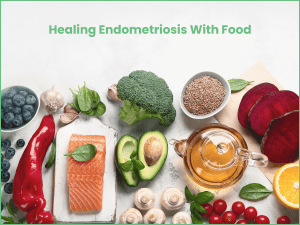For years, endometriosis was such a pain in my butt—literally! And for a long time, I didn’t even know it was the root cause of my pain. Looking back now, from where I stand as a womb healing practitioner, it’s clear that my food choices and endometriosis pain were linked. This post is going to go into why food choices matter.
How Food Choices Impact Endometriosis
From my teenage years onwards, my diet was, to put it lightly, quite inflammatory. I went through a vegan phase and consumed a ton of soy products—soy milk, tofu, fake meats—while regularly indulging in processed foods and sugary drinks. There was a time when I added 3 sugars to my tea, which totalled about 21 teaspoons a day! That alone was contributing to my body’s imbalance. My meals were often sandwiches and rice, and although I’ve always loved vegetables, organic food wasn’t on my radar at the time.
Now, looking back, it’s clear to me that the foods I ate contributed to my endometriosis pain. As I began to coach others and work with clients, I saw similar patterns in their diets. Often, cleaning up their diet was one of the key steps in relieving their pain.
Foods to Avoid When You Have Endometriosis
There are certain foods that can make endometriosis symptoms worse because of their inflammatory properties, ability to create “damp” conditions in the body, or hormonal effects. Some of the biggest culprits include:
- Red Meat: Studies have shown that red meat, especially from animals fed with hormones or antibiotics, can increase inflammation and worsen endometriosis symptoms. Red meat can also contain arachidonic acid, which is known to trigger prostaglandins, promoting inflammation and pain.
- Dairy: Dairy products like milk, yoghurt, and cheese promote “dampness” in the body, according to Traditional Chinese Medicine. This dampness creates the perfect environment for inflammation and endometriosis to thrive. In addition, dairy is high in saturated fats and growth hormones, which can contribute to hormonal imbalances.
- Wheat and Gluten: Many women with endometriosis report that cutting out gluten helps reduce their pain. Gluten can lead to gut inflammation, which exacerbates endometriosis symptoms and creates damp conditions.
- Soy: Soy, especially genetically modified (GMO) soy, can mimic estrogen in the body. This can be a major issue for women with endometriosis, as the condition is often estrogen-dependent, meaning excess estrogen can worsen symptoms. Soy is present in many processed foods, making it tricky to avoid, but it’s worth it.
- Sugar and Artificial Sweeteners: Excessive sugar intake promotes dampness and contributes to insulin resistance and inflammation, which can make endometriosis symptoms worse. A diet high in sugar can also lead to hormonal imbalances and disrupt the gut microbiome, both of which play a role in reproductive health.
Why These Foods Make Endometriosis Worse
Our gut plays a critical role in our overall wellness, and for women with endometriosis, it’s especially sensitive to inflammation. Foods like red meat, dairy, gluten, and soy all have the potential to create hormonal imbalances, promote inflammation, and trigger endo flare-ups. These foods also contribute to damp conditions in the body, according to holistic and Traditional Chinese Medicine practices, which aggravates the stagnant energy and pain associated with endometriosis.

Anti-Inflammatory Food Choices for Endometriosis
If you want to fight inflammation and reduce the symptoms of endometriosis, your diet needs to be filled with nutrient-dense, anti-inflammatory foods. Focus on whole, plant-based options like:
- Kale, spinach, chard, and other leafy greens
- Cruciferous vegetables like broccoli, cauliflower, and Brussels sprouts
- Cucumbers and peppers
- Omega-3-rich foods like salmon, flaxseeds, and walnuts
Eating foods that are naturally anti-inflammatory can make a big difference in how you feel day-to-day, helping to calm the inflammation that fuels endometriosis. Remember, if it grows in the earth, it’s probably good for you. If it’s made in a factory, it’s likely to feed the inflammation and dampness that’s worsening your endo pain.
The Benefits of Changing Your Diet
Lifestyle changes, including dietary choices and avoiding products filled with toxins, became my medicine for managing endometriosis. I remember the exact moments when I realised certain foods were triggering my pain, and how much better I felt when I finally eliminated them.
When you adopt an anti-inflammatory, nutrient-rich diet—like a Mediterranean or pescatarian approach—you give your body the building blocks it needs to heal. This kind of lifestyle isn’t just a temporary “diet” but rather a long-term way to nurture your womb and overall health. The focus is on feeding your body foods that will reduce inflammation, promote gut health, and ultimately improve your reproductive wellness.

0 Comments